- Home
- Tony Hillerman
Coyote Waits jlajc-10 Page 10
Coyote Waits jlajc-10 Read online
Page 10
While he waited for it, he shuffled through the folders Bolack Travel had sent him on China. One concerned a tour sponsored by the Audubon Society, which would focus on visits to bird sanctuaries. He reread parts of that. Emma had been an amateur bird watcherkeeping three feeders stocked in their backyard. The others on the trip would be interesting people, probably. But he would have nothing to talk to them about. Nothing in common. Another tour simply involved visits to cities. That left him cold. His best alternative seemed to be going alone. He would see if any of his old professors were left on the anthropology faculty at Arizona State. It wasn’t likely, but it was possible. If not, maybe someone else there would help him. He’d explain he was an alum, with their master of science in anthropology degree from way back when, and he wanted to go into Asia and see if he could find any roots to his Athabaskan origins. He’d wanted to do that for years, ever since he’d become conscious as an anthropology student that his forebears had probably emerged from Mongolia. It had faded into the subconscious after he’d met Emma and married her. Emma was no traveler. Three days in Albuquerque made her vaguely uneasy, yearning for home. Three days in New York made her miserable. She would have gone with him without a murmur. But taking her would have been cruel.
When the Nez folder arrived, he was examining a picture of a Shanghai street scene, seeing himself there amid the stampede of bicycles. It depressed him.
He spent almost an hour rereading the file and jotting reminders in the slim notebook he always carried in his uniform pocket.
Chee met car. Was it the schoolteacher’s? What did he see?
Expensive whiskey? How? Where bought?
Pistol. Where did he get it?
Two fifty-dollar bills? McGinnis said he was broke.
Did Pinto have his jish with him? Where is it?
Then he called the FBI office at Gallup, got Jay Kennedy, and invited him to lunch.
“What do you want this time?” Kennedy asked.
“Wait a minute,” Leaphorn said. “Remember. Last time somebody wanted something it was you. You wanted me to check a homicide scene for tracks.”
“Which you didn’t find,” Kennedy said.
“Because there weren’t any,” Leaphorn said. “Besides, I’ll buy.”
“I’ll have to cancel something,” Kennedy said. “Is it important?”
Leaphorn considered. And reconsidered.
“Well?”
“No,” Leaphorn said. He considered again. “Probably not.”
He heard Kennedy sigh. “So what are we talking about? Just in case I need to look something up. Or dig into something so confidential that it might cost me my job.”
“Delbert Nez,” Leaphorn said.
“Oh, shit,” Kennedy said. “Naturally.”
“Why?”
“It was a sloppy job,” Kennedy said. “Even worse than usual.”
They met at the International Pancake House on old U.S. 66 and sat a while sipping coffee. The autumn sun warmed Leaphorn’s shoulders through his uniform jacket and the traffic streamed by off Interstate 40. He noticed how gray Kennedy had become, howuncharacteristic of FBI agents and of Kennedy himselfhe needed a haircut. Old cops, Leaphorn thought. Two old dogs getting tired of watching the sheep. Old friends. How rare they are. The Bureau would be glad to see the last of Kennedyexiled here years ago for some violation of the old J. Edgar Hoover prohibition against bad publicity, liberalism, or innovative thinking. The story was that Kennedy’s ex-wife had been active in the American Civil Liberties Union. She had left him to marry a real estate broker, but the stigma remained.
For that matter, Leaphorn suspected there were those in his Navajo Tribal Police hierarchy who would be happy to celebrate his own retirement. He wouldn’t make them wait much longer.
Kennedy had been talking about one of those endless interagency shoving matches which involve public employeesthis one an effort of the Bureau of Land Management, the Forest Service, the Bureau of Indian Affairs, and “The Bureau” to make one or another of them responsible for protecting Anasazi ruins under the Antiquities Act. Leaphorn had heard a lot of it before.
Kennedy quit talking. “I’m not holding your attention,” he said.
“You ever been to China?” Leaphorn asked.
Kennedy laughed. “Not yet,” he said. “If the Bureau opens an office theresay in North ManchuriaI’ll get the assignment.”
“Think you’d like to go?”
Kennedy laughed again. “It’s on my wish list,” he said. “Right after Angola, Antarctica, Bangladesh, Lubbock, Texas, and the Australian outback. Why? Are you planning to go?”
“I guess not,” Leaphorn said. “Always sort of wanted to. Wanted to go out in the steppe country. Outer Mongolia. The part of the world where they think the Athabaskans originated.”
“I used to want to go back to Ireland,” Kennedy said. “Where my great-grandfather came from. I outgrew that notion.”
“Yeah,” Leaphorn said. “Do you know if anybody checked on that pistol Pinto used?”
“Somebody checked,” Kennedy said. “It was a common type, but I don’t remember the brand. American made, I think it was, and an expensive model. It had been recently fired. The slug in Nez came from it. Check of Pinto’s hand showed he’d recently fired something.”
“Where did it come from?”
“No idea,” Kennedy said. “The old man isn’t saying. Totally silent from what I hear. I guess he bought it at some pawnshop.”
“I don’t think so,” Leaphorn said.
Kennedy peered at him, expression quizzical. “You’ve been asking around,” he said. “Any reason for that?”
Leaphorn made a wry face. “Turns out Ashie Pinto is sort of shirttail, linked-clan kinfolks of mine,” he said. “Through Emma’s clan.”
“You know him?”
“Never heard of him.”
“But you got roped in.”
“Right,” Leaphorn said. “I don’t think he bought the pistol because he was broke. Not even eating money. What do you know about those two fifties he had?”
“Nothing.”
“Where did Pinto get his hands on them?”
“No idea.” Kennedy looked irritated. “How would we know something like that?”
“Did anybody check on the driver of the car Chee met going to the fire?”
Kennedy shook his head. “I told you it was a sloppy job. But damn it, Joe, why would they check on that? Look what you had there. No big mystery. A drunk gets arrested and kills the policeman. Doesn’t even deny it. What’s to investigate? I know you think we loaf around a lot, but we do have things to do.”
“Did Pinto have his jish with him? You know where that is?”
“Jish?” Kennedy said. “His medicine bundle? I don’t know.”
“He was a shaman. A crystal gazer. If he was on a job, he’d have his crystals with him, and his jish.”
“I’ll find out,” Kennedy said. “Probably he wasn’t working. Left it home.”
“We didn’t find it at his place.”
Kennedy looked at him. “You been out to his place, then.”
The waitress delivered the waffles, which smelled delicious. Leaphorn applied butter, poured on syrup. He was hungry and he hadn’t been hungry much lately. This Ashie Pinto business must be good for him.
Kennedy had hardly looked at his waffle. He was still looking at Leaphorn.
“We?” he said. “You been out searching Pinto’s hogan? Who’s we?”
“Pinto’s niece,” Leaphorn said. “And a woman named Bourebonette. A professor at Northern Arizona University. You guys turn up anything about her?”
“Bourebonette? No. Why would we? How would she fit into this?”
“That’s what bothers me,” Leaphorn said. “She says Pinto was one of her sources for myths, legends, so forth. That’s her field. Mythology. She says she’s into it because he’s a friend. Just that.”
Kennedy peered at him. “You sound li
ke you have trouble believing that.”
Leaphorn shrugged. “Sophisticated, urbane university professor. Old illiterate Navajo. And she’s going to a hell of a lot of trouble.”
“You’re getting even worse with age,” Kennedy said. “Emma used to make you a little more human.” He buttered his waffle. “Okay, then. What do you think motivates the woman?”
Leaphorn shrugged again. “Maybe she’s working on a book. Needs more out of him to finish it off.”
“She could get to him in prison. They’re not going to put somebody like that in solitary. Not even for killing a policeman.”
“I don’t know then. What do you think?”
“Why not just believe she’s nuts? Likes the old bastard. She’s doing it for humanitarian reasons. You actually went all the way out there and searched the old man’s hogan?”
“I didn’t search. No warrant.”
“You’re getting serious about this, aren’t you?” Kennedy said. “You think there’s something more to it than just Pinto being drunk and killing your man?”
“No,” Leaphorn said. “I’m just curious.” The waffle was wonderful. He chewed a second bite, swallowed, sipped his coffee. “Have you found that car that Chee saw? The old white Jeepster?”
“Didn’t we already cover that? You asked me about the driver.”
“And I noticed how you didn’t exactly answer. You just sort of nodded, and said it had been sloppy work, and then did your little sermon about why waste time on a made case.” Leaphorn was grinning at him. “When the Bureau dumps you I hope you don’t get into playing poker for a profession.”
Kennedy made a wry face. He chewed for a while.
“It took you longer to get to it than I expected,” Kennedy said. “But you never fail to get there. Right to the touchy spot.”
“Touchy?”
“How much do you know about the car?”
“Nothing,” Leaphorn said. “Just what was in the report. Chee saw an old white Jeepster coming from the direction of the crime, turning on a gravel road toward Ship Rock. Chee thought it belonged to an Oriental who teaches at the high school. There was nothing in the report about checking on that car.”
“They found it,” Kennedy said. He eyed Leaphorn. “This is one of those ‘you don’t remember where you heard it’ times.”
“Sure,” Leaphorn said.
“The car belonged to a man named Huan Ji. He teaches math at Ship Rock High School. Just been there four years. No way he’d have anything to do with this crime. He couldn’t have known Pinto or Nez.”
Leaphorn waited for more. Kennedy sipped the last of his coffee, signaled the pretty Zuni girl who was their waitress.
“Ready for a refill,” he said, indicating his cup.
Kennedy had said all he wanted to say about Juan Gee and the car. Why?
“What was this Gee doing way out there in the rain?” Leaphorn asked. “What did he see? What did he tell you?”
Kennedy grimaced and peered across his coffee cup at Leaphorn.
“You remember the Howard case in Santa Fe. The defrocked CIA agent who was working for the State of New Mexico, and the CIA thought he had sold out to the Russians, and we had him staked out watching him until somebody could get around to filing charges. You remember.”
“I remember,” Leaphorn said, grinning. “The part I remember best was the ingenious way he slipped away from you guys. Had his wife drive the car.”
Kennedy grinned, too, even broader than Leaphorn. “Embarrassment squared. Embarrassment to the third power,” he said. The grin turned into a chuckle. “Can you imagine what it was like in the Albuquerque office when the powers found out Howard was safely behind the Iron Curtain? Hell was raised. Fits thrown. Carefully written reports were sent out explaining why it hadn’t occurred to the Bureau that Howard might have his wife driving the car on the escape run.”
“I can imagine the CIA people were rubbing it in.”
“I think you can be sure of it,” Kennedy said.
“Can I be sure that all of this is going to have some bearing on why nobody talked to this Juan Gee?”
“You can,” Kennedy said. “It seems the Bureau was aware that Huan Ji was a friend of the Agency. He was a colonel in the South Vietnamese Army. In intelligence, and he was working for Washington as well as Saigon. We have this vague, scuttlebutt impression that he was one of the very hard people, involved with the sort of stuff we used to hear the horror stories about.”
“Like dropping Vietcong out of helicopters so the one you didn’t drop would be willing to talk?”
“I don’t know,” Kennedy said. “It was just gossip. But anyway he was a client, so to speak, of the CIA and so when everything went to hell over there in 1975 and the Saigon government collapsed, they got him out and helped him get started in the States.”
“A Vietnamese named Juan?” Leaphorn asked.
“It’s H-U-A-N and J-I. Sounds like ‘Gee.’”
“So why didn’t the FBI talk to him?” Leaphorn asked, thinking he already knew the answer.
Kennedy looked slightly defensive. “Why talk to him? The case was all locked up. The arrest was made. We had the smoking gun. No mystery. Nothing to resolve. We didn’t really need another witness.” He stopped.
“And bothering this guy would look bad to the CIA. Would maybe irritate the CIA, which is already sneering at you guys for letting Howard walk away.”
“More or less, I’d say,” Kennedy admitted. “I’m not privy to the upper councils, but I’d say that is a close guess.”
Leaphorn ate more waffle.
“And what the hell’s wrong with that? Why waste everybody’s time? Why piss off the Agency? Why bother Mr. Ji?”
“I just wonder what he was doing out there,” Leaphorn said. ‘That’s all.”
Kennedy finished his waffle. “I’ve got to go to Farmington,” he said. “A hundred bumpy miles up Route 666. And then a night in a Holiday Inn.”
“You sure you don’t want to go to China?”
“About as much as I want to go to Farmington,” Kennedy said. “And don’t forget to leave a generous tip.”
Leaphorn watched Kennedy leave. He saw his car pull out of the Pancake House parking lot onto old 66, heading for the long drive north to Farmington. He was still wondering what Colonel Ji was doing out in the rain by the rock where the witches gather. Chapter 11
THE HAND MAN’S reputation was as good as they get in modern medicine. He had identified himself as an “Indian Indian,” smiling as he said it and giving Chee a name which Chee instantly forgot. His voice carried a slight British accent with a trace of lilt in it, and he asked his questions in a soft, gentle voice without looking at Chee, never taking his eyes off the ugly, puckered cavity burned across Chee’s left palm. With the Burn Doctor, a woman named Johns, the Hand Man discussed tendon damage, ligament damage, nerve damage, regeneration of tissue, “prognosis for usage,” and “viability of surgical techniques.”
“You clutched the handle of a car door? Is that how I understand it? And the car was burning?” He glanced at Chee’s right hand.
“But you are right-handed, is it not true? Why did you use your left hand?”
“I guess because it’s natural to open the driver’s door that way,” Chee said. “If I had another reason I don’t remember it.”
“It’s almost as if your subconscious sensed the forthcoming damage and protected the hand most useful to you.” The Hand Man said it in a clipped, didactic tone, still staring at the angry red mass of scarring on Chee’s palm, never glancing up. “Would you agree?”
“I doubt it,” Chee said. “I’d guess it was also because I was going to pull Delbert out of there with my right hand. But it’s all sort of hazy to tell the truth.”
“Ah, well,” the Hand Man said, no longer interested. And that was that. The Burn Doctor put on a new bandage, using a different wrapping technique. She gave Chee a prescription and instructions, and said she would see him in
a week.
“Well, what do you think?” he asked the Burn Doctor.
“Think?”
“About surgery. About how much use I’ll regain of my fingers. Things like that?”
“We’ll have to decide,” the Burn Doctor said. “You’ll be informed.”
“Appreciate it,” Chee said, but the Burn Doctor didn’t notice the irony.
He used the pay telephone again. This time Janet Pete was out. She was in Santa Fe, the receptionist at the Federal Public Defender’s office told him. She was involved with picking a jury for a forthcoming trial. Would she be home this evening? The receptionist had no idea.
Chee called Professor Tagert’s office. Jean Jacobs answered. No, Tagert still hadn’t checked in.
“Can I come over? Do you have time to talk?”
“Sure,” Jacobs said. “About what?”
“Mr. Redd told us about Tagert’s interest in Butch Cassidy. He said Ashie Pinto had helped Tagert find what might be Cassidy’s trail. Out on the Reservation.”
“Okay,” Jacobs said. “I know he’s obsessed with Cassidy but I don’t know much about it.”
Chee walked, feeling disgruntled. Janet Pete knew he would be back in Albuquerque today. He’d written her a note, telling her. So, maybe she couldn’t avoid the Santa Fe duty. On the other hand, maybe she could have. Chee had been around long enough to know how priorities worked when there was a conflict between duty and desire.
He crossed the mall with fallen sycamore leaves blowing around his feet. His hand hurt. His fingers wouldn’t respond properly. He felt discouraged. Blue. Bored. Undecided. He found the door of Dr. Tagert’s office open. Jean Jacobs sat, elbows on desk, chin on hands, staring out the window. She looked blue, bored, and undecided.
“I’m glad to see you,” Jean Jacobs said. “I’ve got a million things to do.” She slapped an angry palm onto a pile of paperwork. “All this goddamn Tagert work, and all my own work andoh, to hell with it.”
“Yeah,” Chee said. “Sometimes that’s about it.”
“So screw it all,” she said. “I hope you have just walked in here with something that is not only totally time-wasting but mysterious. We’ll figure out how to find the vanished professor of history.” She paused. “Even better, we’ll figure out where they hid the bastard’s body.”

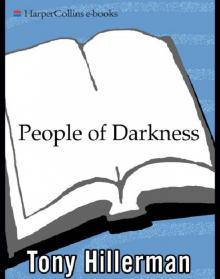 People of Darkness
People of Darkness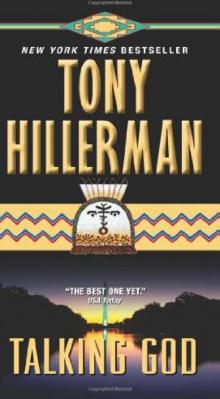 Talking God jlajc-9
Talking God jlajc-9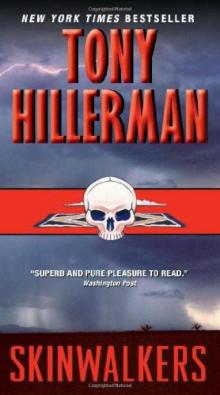 Skinwalkers jlajc-7
Skinwalkers jlajc-7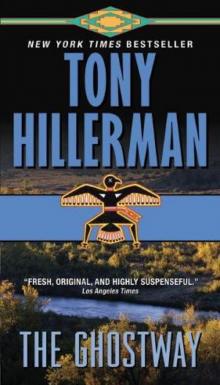 The Ghostway jlajc-6
The Ghostway jlajc-6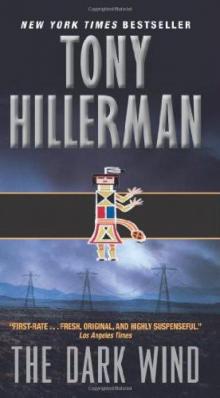 The Dark Wind jlajc-5
The Dark Wind jlajc-5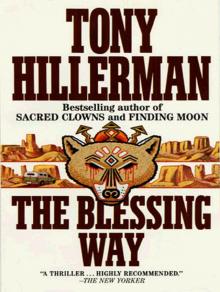 The Blessing Way
The Blessing Way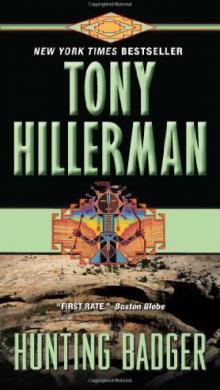 Hunting Badger jlajc-14
Hunting Badger jlajc-14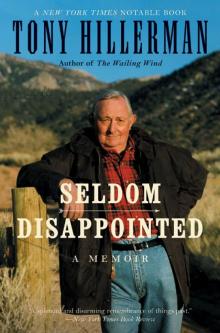 Seldom Disappointed: A Memoir
Seldom Disappointed: A Memoir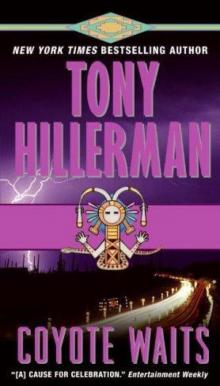 Coyote Waits jlajc-10
Coyote Waits jlajc-10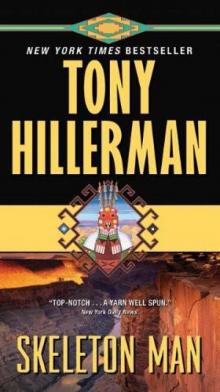 Skeleton Man jlajc-17
Skeleton Man jlajc-17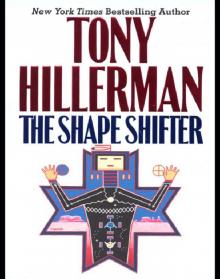 The Shape Shifter
The Shape Shifter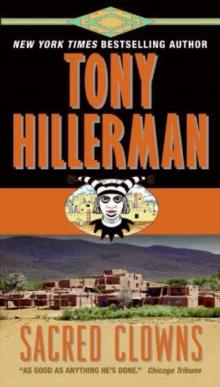 Sacred Clowns jlajc-11
Sacred Clowns jlajc-11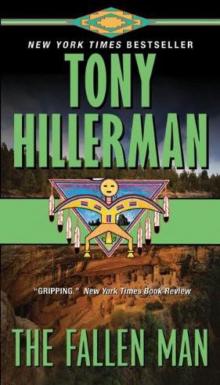 The Fallen Man jlajc-12
The Fallen Man jlajc-12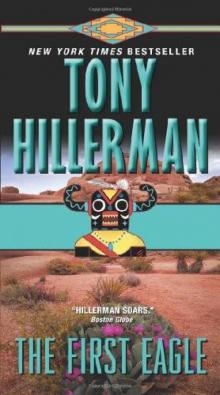 The First Eagle jlajc-13
The First Eagle jlajc-13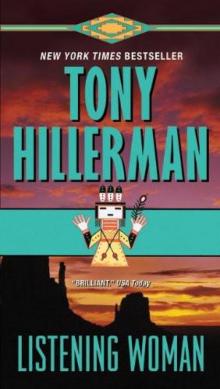 Listening Woman jlajc-3
Listening Woman jlajc-3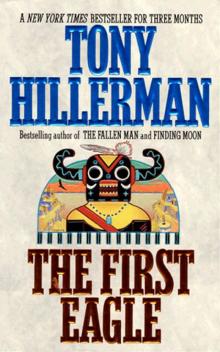 The First Eagle
The First Eagle Skeleton Man
Skeleton Man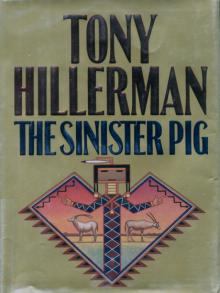 The Sinister Pig jlajc-16
The Sinister Pig jlajc-16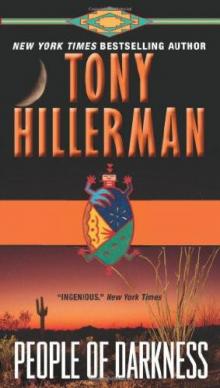 People of Darkness jlajc-4
People of Darkness jlajc-4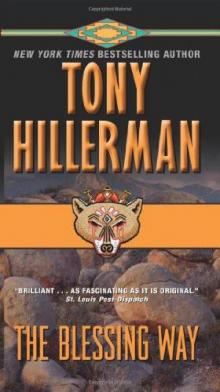 The Blessing Way jlajc-1
The Blessing Way jlajc-1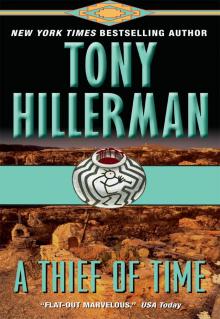 A Thief of Time
A Thief of Time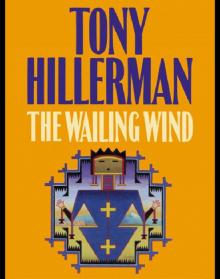 The Wailing Wind
The Wailing Wind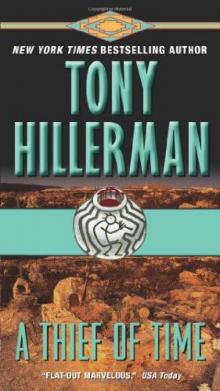 A Thief of Time jlajc-8
A Thief of Time jlajc-8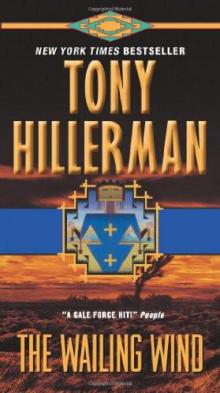 The Wailing Wind jlajc-15
The Wailing Wind jlajc-15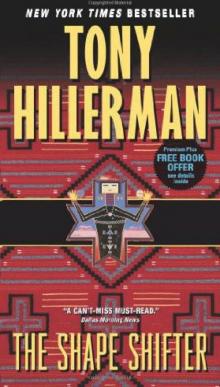 The Shape Shifter jlajc-18
The Shape Shifter jlajc-18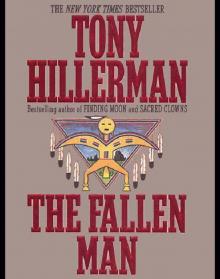 The Fallen Man
The Fallen Man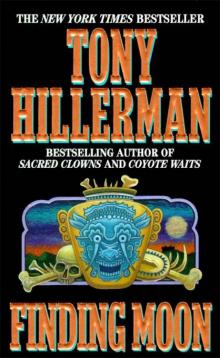 Finding Moon
Finding Moon